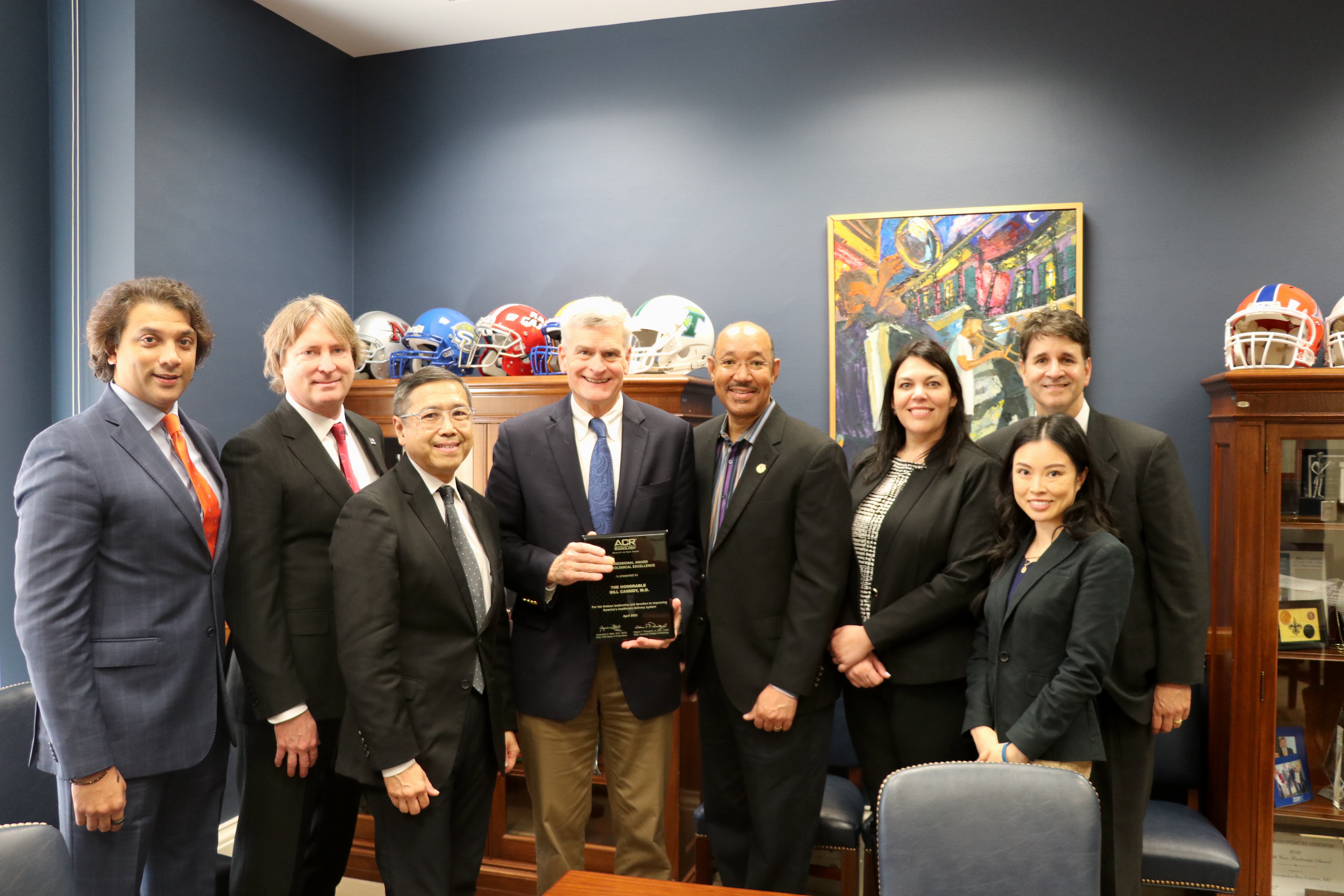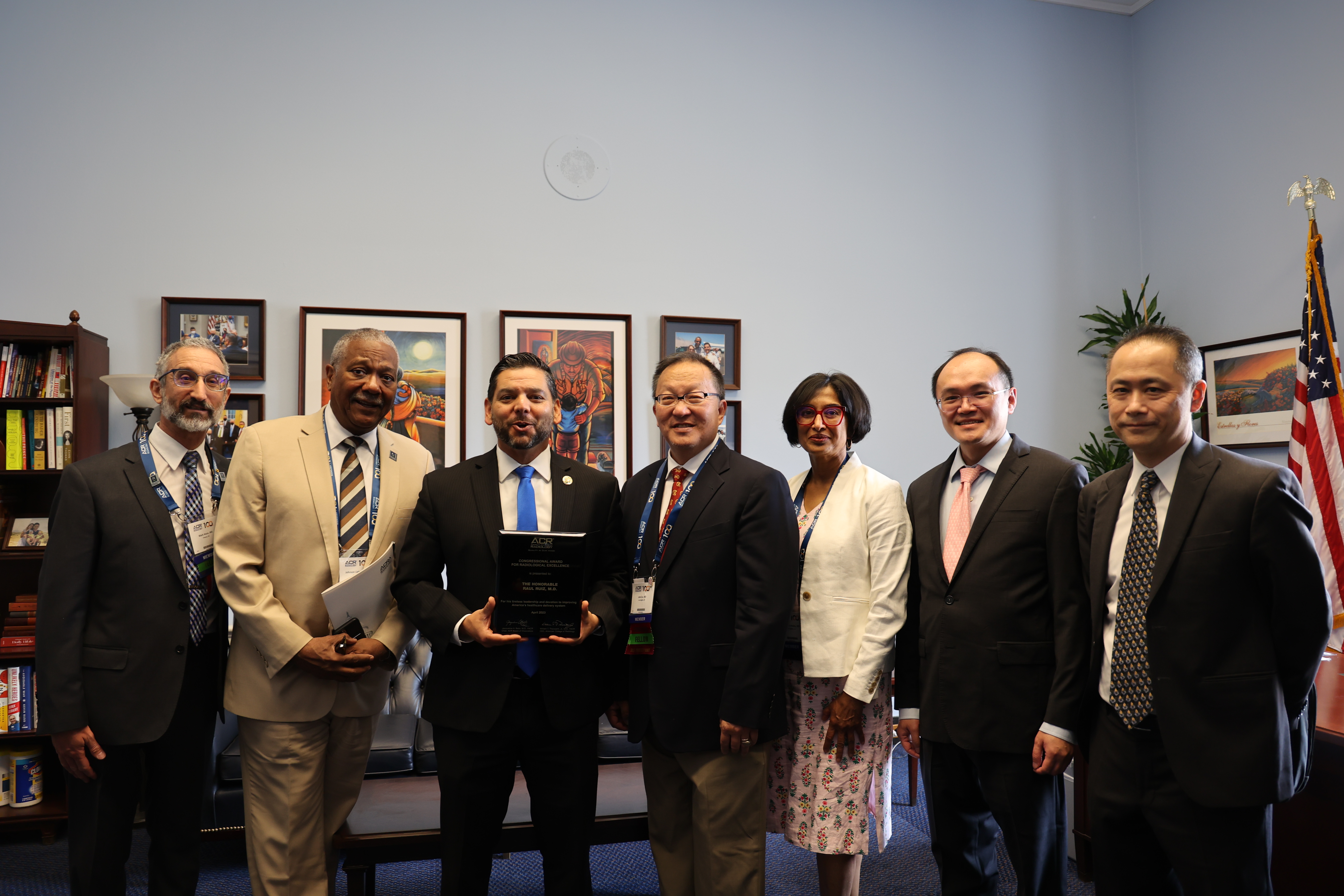Federal Legislative Update
CARE Award Recipients
 Senator Bill Cassidy, MD (R-LA) with members of the Radiological Society of Louisana.
Senator Bill Cassidy, MD (R-LA) with members of the Radiological Society of Louisana.
 Rep. Raul Ruiz, MD (D-CA) with members of the California Radiological Society.
Rep. Raul Ruiz, MD (D-CA) with members of the California Radiological Society.
Senator Cassidy and Representative Ruiz are recipients of the ACR's Congressional Award for Radiological Excellence (CARE) for their legislative support and efforts on surprise billing and Medicare reform.
ACR-Led Coalition Continues to Work with Congress to Address Medicare Payment Cuts
In April, as a result of advocacy by an ACR-led coalition, Reps. Raul Ruiz, MD (D-CA), Larry Bucshon, MD (R-IN), Ami Bera, MD (D-CA), and Mariannette Miller-Meeks, MD (R-IA), introduced H.R. 2474, the Strengthening Medicare for Patients and Providers Act. The legislation would add a permanent, MEI-based inflationary update to the Medicare Physician Fee Schedule (MPFS).
The ACR-led coalition of more than 100 physician and non-physician provider organizations
sent a letter thanking the bill cosponsors, offering broad support, and emphasizing the importance of adding an inflationary update to the MPFS to ensure our members have fiscal stability as they continue to provide healthcare to patients in an increasingly challenging environment.
During the College’s annual Hill Day in May, participating ACR members asked their representatives to cosponsor HR 2474. A call-to-action was also issued, urging ACR members to contact their representative and surge support of the bill. Over 1,400 messages were sent to the hill. ACR, along with the coalition, will continue to engage Congress on this legislation.
For more information about ACR’s actions to fight Medicare reimbursement cuts, please contact
Rebecca Spangler, ACR Senior Government Affairs Director.
No Surprises Act Legal Update
On February 6, 2023, a federal court invalidated parts of the No Surprises Act (NSA) regulations regarding the Independent Dispute Resolution (IDR) process for resolving payment disputes between providers and insurers. Those regulations unlawfully placed a “thumb on the scale” for the controversial Qualifying Payment Amount (QPA) over other factors arbitrators must consider. ACR had joined this lawsuit (“TMA II”) by the Texas Medical Association (TMA) as a friend of the court, with the American Society of Anesthesiologists (ASA) and American College of Emergency Physicians (ACEP).
Following that decision, the federal government updated its guidance for the IDR process under the NSA. The new guidance instructs IDR entities to consider both the QPA and additional information relating to the offers submitted by the parties. The new guidelines also instruct the certified IDR entities to provide an explanation of the rationale for their decision.
The federal government also announced its intent to appeal the TMA II decision and filed its brief with the court on July 12. They assert that the district court failed to defer to the Departments’ “reasonable” exercise of their regulatory authority which mandated that arbitrators consider initially the QPA under the NSA final rule in August 2022. Similarly, the Departments claim that the lower court misread that rule because they followed the court’s order in TMA I to remove the QPA’s “privileged” status. Additionally, the Departments maintain that the TMA II lower court wrongly vacated nationally the QPA provisions of the final rule. ACR, along with others, will file a reply brief.
ACR, with ASA and ACEP, have also supported as friends of the court in two other NSA lawsuits by the TMA (“TMA III and IV”). These cases challenge restrictive rules on “batching” claims for arbitration and the 600% administrative fee increase for the IDR process that CMS announced in December 2022. The court heard oral arguments on April 19 and decisions will be announced in the coming days.
ACR Urges Congress to Address Physician Payment Cuts Associated with Clinical Labor Policy
The American College of Radiology® (ACR®) and other national medical societies have been working with Congress to address payment cuts associated with a Centers for Medicare and Medicaid Services (CMS) clinical labor pricing update. This policy was finalized in the Calendar Year 2022 Medicare Physician Fee Schedule (MPFS) rule to update clinical labor pricing over a four-year period starting January 1, 2022.
Last year, ACR and other stakeholders requested new funding for the MPFS for the explicit purpose of increasing the non-facility/office-based practice expense relative value units (NF Pe RVUs) negatively impacted by CMS' clinical labor update policy. While no legislation was advanced at that time, a new bill has been introduced to address these cuts, the Providing Relief and Stability for Medicare Patients Act (H.R. 3674).
Clinical labor staff, medical supplies, and equipment costs are three components of direct practice expense (PE) inputs, which are costs directly associated with the provision of a service or procedure. They are budget neutral, which means that an increase in payment for one component typically means a proportional decrease in payment for the other components. CMS recently updated clinical labor staff wages, and the budget neutrality application has resulted in significant code level reduction for codes with high medical supplies and equipment costs, including some interventional radiology and radiation oncology codes.
H.R. 3674 specifically addresses these payment cuts by providing two years of targeted relief for specialty care practices through an increase to the non-facility practice expense relative value units (PE RVU’s) for services performed in an office-based setting that require the use of high-tech medical devices or piece of medical equipment. This relief is targeted at those services that were most negatively impacted under the 2022-2025 Medicare Physician Fee Schedule cuts stemming from the update to the clinical labor policy.
For more information, please contact
Ashley Walton, ACR Government Affairs Director.
